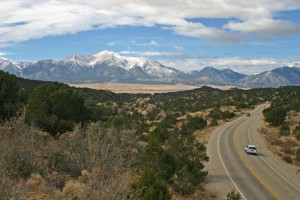by John Orr
State Representative Curry’s bill: What a Long Strange Trip It’s Been
State Representative Kathleen Curry’s bill, HB 10-1188, was designed to clarify the rights of outfitters on Colorado streams that have been traditionally used for rafting. The original bill meant to allow portages during high water and the right to float certain reaches around the state.
After the state house approved the bill by a margin of 40-25 – on pretty much a party-line vote – opponents dug in and started lobbying the members of the Senate Judiciary Committee. They were hoping to keep the bill bottled up in the committee and avoid a floor vote.
The opposition showed up in Denver for a seven- hour committee hearing and were nearly successful stopping it. Democrat Sen. Evie Hudak was the swing vote and she was still unsure about her vote later in the day, telling The Durango Herald, “I was undecided until the very last second. I’m not kidding you.” Later she told The Denver Post, “This is a bad bill, but killing it would be bad too.”
A Texas developer stirred up Representative Curry by telling two Gunnison County outfitters that he planned to close off access to the Taylor river through his property this year. The developer’s attorney, John Hill, told The Denver Post, “The public has no right to float through private property without the consent of the landowner.”
On a March Monday the Judiciary Committee tacked on an amendment that would broaden the scope of the bill to include private boaters. The committee also narrowed the bill to include only those reaches that were run by commercial operations between 2000 and 2009.
The bill seemed well on its way to passage. However, during the floor debate in the full senate State Senator Al White managed to introduce an amendment that turned the bill into a six-month privately funded study.
White’s amendment calls on the Colorado Water Congress, a private water rights organization, to study the potential effects of the bill and report back at the end of October. That won’t help the outfitters on the Taylor River this year but it allows state legislators to avoid going on record with a vote that could aggravate private landowners, boaters and fisherman, all at the same time, in an election year.
Doug Kemper, executive director of the Colorado Water Congress (CWC), was in Washington D.C. when he heard about the organization’s new role. He told The Durango Herald, “It’s one of those things – if you don’t attend a meeting, you get put in charge.”
Another CWC member told Colorado Central Magazine, “It was bizarre. We didn’t ask for this, we don’t know how Al White came to involve us. Where will the funding for the study come from?” The CWC is on record opposing the bill in its original form.
You have to love Representative Curry though. Denver Post blogger Jessica Fender reports, “Rep. Kathleen Curry, an unaffiliated lawmaker from Gunnison, said she’ll either try to force an up or down Senate vote on her version of the bill or ask for compromise through a conference committee. Either move could kill the legislation altogether.”
As we go to press the Senate’s amendments to HB 10-1188 are being bandied about in the House.
Buena Vista Huddles up with Nestlé over Pipeline Route
Now that Nestlé Waters North America’s Chaffee County Project has a county permit in hand more details have been flushed out in the design for the pipeline route from the old Hagan trout hatchery to the truck terminal near Johnson Village. Nestlé currently wants to trench to cross the Arkansas River rather than bore under the stream as was first proposed. The Buena Vista Board of Trustees likes the idea and plans to piggyback on the crossing with pipe of their own, courtesy of the Nestlé shareholders.
Nestlé plans to truck 200 acre-feet or so per year over Trout Creek Pass and Kenosha pass to a bottling facility in Denver. The water will be replaced in the Arkansas River – as required to protect senior rights holders – with Twin Lakes Project water leased from the city of Aurora.
Transbasin Diversion Mitigation Bill Defeated in the State House
State Representative Sal Pace’s bill to require mitigation in the basin of origin when water is diverted out of basin died on the state house floor in early February.
The bill would have required negotiations between those planning to move the water and those that would be hurt by the diversion. If the two sides could not come to an agreement, the water court would have been required to determine mitigation for the originating basin.
State Representative Jerry Sonnenburg argued that the bill would have accelerated the drying up of farms in the South Platte Basin as municipalities would take the path of least resistance to water. Most of Colorado’s population and economic engine are located along the eastern plains. Sonnenburg was joined by lobbyists from Denver Water and Aurora Water in claiming that the bill was an attempt to end all transbasin diversions.
The western slope is already protected from new transbasin diversions by the 1937 Conservancy District Act which requires mitigation. Pace’s bill was directed at the thirsty Denver suburbs that are looking south into the Arkansas River Basin.
Front Range Water Council presents ‘Water and Colorado’s Economy’
The Colorado Water Congress held its annual convention in Denver in January and the Front Range Water Council – made up of the major diverters of west slope water – was on hand to present their recent study of the economics around water throughout the state.
Presenters – including Eric Wilkinson from the Northern Colorado Water Conservancy District – stressed that the study really just showed the interconnectedness of Colorado’s economy. However, they didn’t miss a chance to tout the disparity-calculated per acre-foot of water diverted by region. The Pueblo Chieftain reported, “Perhaps the most alarming computation in the report was the economic output of a region divided by the amount of water diverted. By that yardstick, the Front Range showed a value of $132,268 per acre-foot, with Central Colorado (the Upper Arkansas Valley, Huerfano and Park counties) at $12,326, and the Western Slope at $7,200. The two areas most dependent on agriculture fell behind distantly: the Eastern Plains, $3,342, and San Luis Valley, $1,209.”
Short Takes
• In January the Environmental Protection Agency reached another milestone at the California Gulch superfund site when Operable Unit 8 was deleted from the agency’s National Priorities List.
• State Senate Bill 10-027 passed the state house on March 17. The bill sets fines for surface irrigators that divert out of priority.
• Congratulations to the Colorado Water Conservation Board and the Colorado Water Trust. In February they announced a deal for a total of 5.45 cubic feet per second of water rights from the Breem ditch near Crested Butte which will help the water-short Washington Gulch flow year round.
• On March 1 Seattle attorney Drew Falkenstein filed a lawsuit agains the City of Alamosa on behalf of 29 parties sickened by the city’s salmonella outbreak in March 2008. The suit claims negligence by the city due to the condition of certain city facilities.
• Congratulations to Alexandra Davis. In March she was named by Governor Ritter to head up the Interbasin Compact Committee. The committee oversees solutions to Colorado’s water supply needs.
John Orr follows Colorado Water issues at Coyote Gulch http://coyotegulch.net

